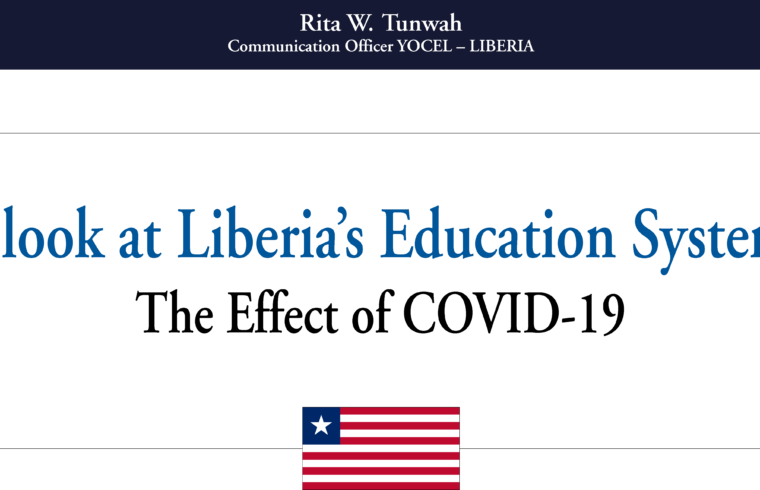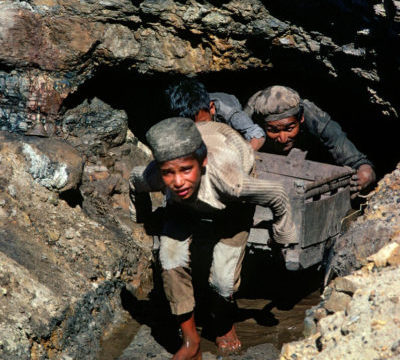Rita W. Tunwah
Communication Officer YOCEL – LIBERIA
The issue of quality education in Liberia has been an old age discussion for decades now. After working in the education sector for over six years, the Youth Coalition for Education in Liberia-YOCEL and other partners have observed with grave curiosity serious gaps in revamping the education sector. The organization has proffered strong recommendations towards the betterment of the sector but up to date, these alarming weaknesses continue to exist.
Liberia suffered fourteen (14) years of civil war, then came the deadly Ebola disease outbreak and the COVIOD-19 pandemic which greatly weakened almost every sector of our country. Education, like most sectors, is one of the most affected areas that is struggling to recover from all these shocks.
It is a fundamental right for all human beings to have equal access to quality education as provided in Article 26 of the Universal Declaration on Human Rights which calls for free and compulsory elementary and primary education and the availability of technical and professional education for all. But Liberians continue to witnessed complex challenges in achieving this as the sector still remains engulfed with series of problems such as inadequate budgetary allocations, high number of out-of-school children, poor learning outcomes, poor infrastructures, unskilled and unqualified teacher and overage enrollment, lack of effective monitoring and evaluation amongst others.
According to fi ndings from World Bank and other development partners, Liberia has made some significant progress over the years to revamp the education sector, ranging from policy reform and strategies some of which include but not limited to the Education Reform Act of 2011, the Getting to Best Education Sector Plan for 2017-2021 (initiated by our former president Madam Ellen Johnson Sirleaf) the Girls’ Education Policy to the COVID-19 Education Response Plan amongst others.
Despite all the interventions, there is still a lot to be done to eradicate the impact of the war, Ebola and COVID- 19 on our already challenged educational sector as reports indicate that in all primary grades, the majority of enrolled students are three to six years older than the official age for the grade; and there is a wide distribution in the age range of students enrolled in each grade compared to other neighboring countries.
There still exists a huge gap in teacher to student radio and teaching outcome, according to a World Bank Report on the Education sector analysis of 2016, Across all schools and levels of education, the Student-Qualifi ed Teacher Ratio (SQTR) ranges from 33.8 to 90.0, with a means of 43.5. but in eight counties across Liberia, the SQTR is above 60. These disparities are important because teachers account for approximately 85 percent of MoE expenditure, and access to trained teachers is very crucial to improving learning outcomes.
Liberia recorded its fi rst confi rmed case of COVID- 19 on March16, 2020 after WHO had declared the virus a global pandemic. The President of Liberia declared COVID-19 a national health emergency on April 10, 2020. In order to curtail the spread of the Corona Virus, the Ministry of Education (MoE) ordered the closure of all schools, which resulted to the disruption of learning activities for more than 2 million children, adolescents and youth.
To mitigate the impact of the above situation, the Ministry of Education and its partners established practical distance learning and wellbeing options for learners at home through Radio lessons aired on several stations across the country. MoE also established the Education in Emergency (EIE) Technical Working Group which comprises of education and humanitarian sector partners who aligned their programming to contribute to the emergency response, including reprogramming of funds initially earmarked for regular development programs. The MoE also developed its own sector response plan which aligned to the National COVID-19 Response Plan.
These measures are highly commendable but could not be benefi cial (ACCESSABLE) to majority of the ordinary Liberian children who resides in the remote parts of rural areas with no or limited access to smartphones, radio courage etc., especially giving the fact that digital technology has not been integrated into our education system.
It is evident that the longer children are out of school, the higher the risks that vulnerable children may not return to school again. Being out of school puts children, especially girls, at increased risk of teenaged pregnancy, sexual abuse, child marriage and other dangers. These negative impacts will be signifi cantly higher for children most especially from poor households.
Since the closure of schools, there has been a high increase in the number of sexual and gender based violence cases including rape, teenaged pregnancy and other form of sexual abuses against adolescents, young women and girls.
Most adolescents and youth have engaged into street selling to help support themselves and their families while other young girls are involved into prostitution and some are forced into early or forced marriages.
Considering these troubling circumstances, it became difficult for most children to return to school after the Government of Liberia through the Ministry of Education declared schools reopened.
At present, the number of children enrolled in school has dropped drastically compared to previous years before COVID-19 due to these outlined factors.
In order for education to improve in Liberia, we must invest more time and resources into the sector. The Government of Liberia should see reason to increase the education budget by at least 20% or more as provided in the Dakar Framework, the Incheon Declaration and other National and international instruments to which Liberia is a signatory.
In addition, there is a need for the Ministry of education to strengthen monitoring and evaluation mechanism in all schools and school related activities across Liberia, most especially in the rural areas and the fullimplementation for educational instruments and policies that give equal access to Technical Vocational Educational Trainings-TVETS for all.
We are hopeful that the new road map and the COVID-19 Education Response Plan can be fully implemented to address the fl aws in the Education sector and the numerous post COVID-19 challenges faced by children most especially girls, and development partners should provide the needed resource through technical, moral and financial support to ensure that this threat which is consider as a national security concern and borders on our human capital development portfolio. Urgent attention is needed sooner than later to revert this, taking it from worse to best.











